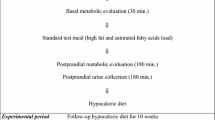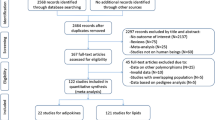Abstract
Objectives
To examine the effects of β3-adrenergic receptor gene polymorphism on body weight change during a weight reduction program for middle-aged, overweight women with careful consideration of their energy intake and expenditure.
Methods
Design: Intervention study of weight reduction for 12 weeks in a community setting. Subjects: Eighty overweight middle-aged women who completed the individualized lifestyle modification program. Measurements: β3-adrenergic receptor gene polymorphism was identified by polymerase chain reaction and consecutive restriction fragment-length polymorphism analysis. Anthropometrical parameters, lifestyle factors, blood lipid and glucose levels, physical activity level and energy intake were measured before and at the end of the program.
Results
The numbers of subjects with the Trp64Trp, Trp64Arg, and Arg64Arg genotypes were 45, 30 and 5, respectively. Baseline characteristics among subjects with the 64Arg allele had significantly smaller decrease in body weight and energy intake than those without the 64Arg allele. The change of other clinical characteristics did not differ between the two groups. After adjusting for the %change of energy intake, the %change of body weight did not differ between the two groups.
Conclusion
The 64Arg allele of the β3-AR gene is not likely to be the factor determining the difficulty in losing body weight in Japanese middle-aged, overweight women. Lifestyle factors, such as the decrease in energy intake, might mask the effect of the 64Arg allele on body weight loss. Specific considerations for the management of energy intake would be needed to promote body weight loss for those with the 64Arg allele.
Similar content being viewed by others
References
Emorine LJ, Feve B, Pairault J, Briend-Sutren MM, Nahmias C, Marullo S, et al. The human β3-adrenergic receptor: relationship with atypical receptors. Am J Clin Nutr. 1992; 55:215S-218S.
Krief S, Lonnqvist F, Raimbault S, Baude B, Van Spronsen A, Arner P, et al. Tissue distribution of β3-adrenergic receptor mRNA in man. J Clin Invest. 1993;91:344–349.
Granneman JG. Why do adipocytes make the β3 adrenergic receptor? Cell Signal. 1995;7:9–15.
Strosberg AD, Pietri-Rouxel F. Function and regulation of the β3 adrenoceptor. Trends Pharmacol Sci. 1996;17:373–381.
Granneman JG, Burnazi M, Zhu Z, Schwamb LA. White adipose tissue contributes to UCP1-independent thermogenesis. Am J Physiol. 2003;285:E1230-E1236.
Walston J, Andersen RE, Seibert M, Hilfiker H, Beamer B, Blumenthal J, et al. Arg64 β3-adrenergic variant and the components of energy expenditure. Obes Res. 2003;11:509–511.
Walston J, Silver K, Bogardus C, Knowler WC, Celi FS, Austin S, et al. Time of onset of non-insulin-dependent diabetes mellitus and genetic variation in the β3-adrenergic-receptor gene. N Engl J Med. 1995;333:343–347.
Clement K, Vaisse C, Manning BS, Basdevant A, Guy Grand B, Ruiz J, et al. Genetic variation in the β3-adrenergic receptor and an increased capacity to gain weight in patients with morbid obesity. N Engl J Med. 1995;333:352–354.
Fujisawa T, Ikegami H, Kawaguchi Y, Ogihara T. Meta-analysis of the association of Trp64arg polymorphism of β3-adrenergic receptor gene with body mass index. J Clin Endocrinol Metab. 1998;83:2441–2444.
Kim-Motoyama H, Yasuda K, Yamaguchi T, Yamada N, Katkura T, Shuldiner AR, et al. A mutation of the β3-adrenergic receptor is associated with visceral obesity but decreased serum triglyceride. Diabetologia. 1997;40:469–472.
Mitchell BD, Cole SA, Comuzzie AG, Almasy L, Blangero J, MacCluer JW, et al. A quantitative trait locus influencing BMI maps to the region of the β3 adrenergic receptor. Diabetes. 1999;48:1863–1867.
Widen E, Lehto M, Kanninen T, Walston J, Schuldiner AR, Groop LC. Association of a polymorphism in the β3-adrenergic receptor gene with features of the insulin resistance syndrome in Finns. N Engl J Med. 1995;333:348–351.
Mauriege P, Bouchard C. Trp64Arg mutation in β3-adrenoceptor gene of doubtful significance for obesity and insulin resistance. Lancet. 1996;348:698–699.
Knowler WC. Association of Trp64Arg mutation of the β3-adrenergic receptor gene with NIDDM. Diabetologia. 1996;39:1411.
Odawara M, Sasaki K, Yamashita K. β3-adrenergic receptor gene variant and Japanese NIDDM: a pitfall in meta-analysis. Lancet. 1996;348:896–897.
Buettner R, Schsffler A, Arndt H, Rogler G, Nusser J, Zietz B, et al. The Trp64Arg polymorphism of the β3-adrenergic receptor gene is not associated with obesity or type 2 diabetes mellitus in a large population-based Caucasian cohort. J Clin Endocrinol Metab. 1998;83:2892–2897.
Matsushita Y, Yokoyama T, Yoshiike N, Matsumura Y, Date C, Kawahara K, et al. The Trp64Arg polymorphism of the β3-adrenergic receptor gene is not associated with body weight or body mass index in Japanese: A longitudinal analysis. J Clin endocrinol Metab. 2003;88:5914–5920.
Matsushita H, Kurabayashi T, Tomita M, Kato N, Tanaka K. Effects of uncoupling protein 1 and β3-adrenergic receptor gene polymorphism on body size and serum lipid concentrations in Japanese women. Maturitas. 2003;45:39–45.
Garcia-Rubi E, Calles-Escandon J. Insulin resistance and type 2 diabetes mellitus: its relationship with the β3-adrenergic receptor. Arch Med Res. 1999;30:459–464.
Lee JS. β3-adrenergic receptor gene variant. Nippon Rinsho. 2001;59:785–789. (Article in Japanese)
Marti A, Corbalan MS, Martinez-Gonzalez MA, Martinez JA. Trp64Arg polymorphism of the β3-adrenergic receptor gene and obesity risk: effect modification by a sedentary lifestyle. Diabetes Obes Metab. 2002;4:428–430.
Oksanen L, Mustajoki P, Kaprio J, Kainulainen K, Janne O, Peltonen L, et al. Polymorphism of the β3-adrenergic receptor gene in morbid obesity Int J Obes Relat Metab Disord. 1996;20:1055–1061.
Fumeron F, Durack-Brown I, Betoulle D, Cassard-Doulcier AM, Tuzet S, Bouillaud F, et al. Polymorphisms of uncoupling protein (UCP) and β3 adrennoreceptor genes in obese people submitted to a low calorie diet. Int J Obes Relat Metab Disord. 1996;20:1051–1054.
Tchernof A, Starling RD, Tuener A, Shuldiner AR, Walston JD, Silver K, et al. Impaired capacity to loss visceral adipose tissue during weight reduction in obese postmenopausal women with the Trp64Arg β3-adrenoceptor gene variant. Diabetes. 2000;49:1709–1713.
Benecke H, Topak H, von zur Muhlen A, Schuppert F. A study on the genetics of obesity: influence of polymorphisms of the β3-adrenergic receptor and insulin receptor substrate 1 in relation to weight loss, waist to hip ratio and frequencies of common cardiovascular risk factors. Exp Clin Endocrinol Diabetes. 2000;108:86–92.
Rawson ES, Nolan A, Silver K, Shuldiner AR, Poehlman ET. No effects of the Trp64Arg β3-adrenoceptor gene variant on weight loss, body composition, or energy expenditure in obese, Caucasian postmenopausal women. Metabolism. 2002; 51:801–805.
Yoshida T, Sakane N, Umekawa T, Sakai M, Takahashi T, Kondo M. Mutation of beta sub 3-adrenergic-receptor gene and response to treatment of obesity. Lancet. 1995;346:1433–1434.
Sakane N, Yoshida T, Umekawa T, Kogure A, Takakura Y, Kondo M. Effects of Trp64Arg mutation in β3-adrenergic receptor gene on weight loss, body fat distribution, glycemic control, and insulin resistance in obese type 2 diabetic patients. Diabetes Care. 1997;20:1887–1890.
Shiwaku K, Nogi A, Anuuard E, Kitajima K, Enkhmaa B, Shimono K, et al. Difficulty in losing weight by behavioral intervention for women with Trp64Arg polymorphism of the β3-adrenergic receptor gene. Int J Obes Relat Metab Disord. 2003;27:1028–1036.
Kim OY, Cho EY, Park HY, Jang Y, Lee JH. Additive effect of the mutations in the β3-adrenoceptor gene and UCP3 gene promoter on body fat distribution and glycemic control after weight reduction in overweight subjects with CAD or metabolic syndrome. Int J Obes Relat Metab Disord. 2004; 28:434–441.
Kadowaki H, Yasuda K, Iwamoto K, Otabe S, Shimokawa K, Silver K, et al. A mutation in the β3-adrenergic receptor gene is associated with obesity and hyperinsulinemia in Japanese subjects. Biochem Biophys Res Commun. 1995;145:555–560.
Nagamine S, Suzuki S. Anthropometry and body composition of Japanese young men and women. Hum Biol. 1964;36:8–15.
Brozek J, Grande F, Anderson JT, Keys A. Densitometric analysis of body composition: revision of some quantitative assumption. Ann NY Acad Sci. 1963;110:113–140.
Resources Council, Science and Technology Agency, Japan. Standard Tables of Food Composition in Japan, 5th revised ed., Tokyo, 2000.
Friedewald WT, Levy RI, Fredrick DS. Estimation of the concentration of low density lipoprotein in plasma without use of a preparative ultracentrifuge. Clin Chem. 1972;18:449–456.
Allison DB, Heo M, Faith MS, Pietrobelli A. Meta-analysis of the association of the Trp64Arg polymorphism in the β3 adrenergic receptor with body mass index. Int J Obes Relat Metab Disord. 1998;22:559–566.
Author information
Authors and Affiliations
Corresponding author
Rights and permissions
About this article
Cite this article
Lee, J.S., Kawakubo, K., Inoue, S. et al. Effect of β3-adrenergic receptor gene polymorphism on body weight change in middle-aged, overweight women. Environ Health Prev Med 11, 69–74 (2006). https://doi.org/10.1007/BF02898145
Received:
Accepted:
Issue Date:
DOI: https://doi.org/10.1007/BF02898145




